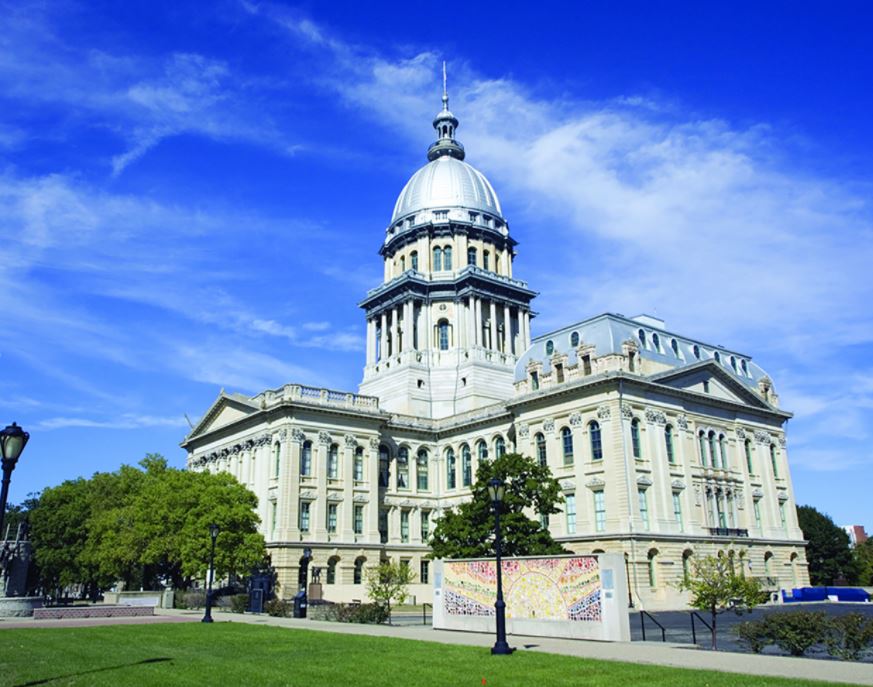The 101st Illinois General Assembly concluded its lame duck session, with legislators working in session throughout the final night and adjourning just moments before the 102nd General Assembly was sworn in, at noon on January 13. The lack of a traditional fall veto session combined with the pandemic protocols governing session led to one of the most chaotic lame duck sessions in recent memory.
Some of the highlighted legislation from lame duck included a series of reforms as devised by the Illinois Legislative Black Caucus to combat systemic racism, along with the healthcare transformation legislation. However, in the end, many of the omnibus bills proved to be too complex and controversial to pass in a short time frame and the clock ran out before work could be completed. Legislation to address ethics reform, solar funding, decoupling of Illinois taxes, cannabis social equity lottery, and many others remain unresolved. The General Assembly also failed to approve legislation to allow for remote legislating during the remainder of the pandemic. The Governor has 60 days from receipt to act upon legislation passed during the lame duck session.
102nd General Assembly
Democrats remain in control of both chambers, with a 73-45 majority in the Illinois House and a 40-18 majority in the Senate. Newly elected House Speaker Emmanuel “Chris” Welch named his leadership team for the 102nd General Assembly as follows:
- Greg Harris, Majority Leader
- Jehan Gordon-Booth, Deputy Majority Leader / Speaker Pro-Tempore
- Mary E. Flowers, Deputy Majority Leader and Dean of the Caucus
- Jaime M. Andrade, Jr., Robyn Gabel, Elizabeth Hernandez, Jay Hoffman, Natalie Manley, Marcus Evans and Delia Ramierz, Assistant Majority Leaders
- Carol Ammons, Democratic Conference Chair
- Will Guzzardi, Progressive Caucus Whip
- Kam Buckner, Black Caucus Whip
- Theresa Mah, Asian Caucus Whip
- Larry Walsh, Jr., Downstate Caucus Whip
- Deb Conroy, Women’s Caucus Whip
- Aaron Ortiz, Latinx Caucus Whip
Senate President Don Harmon announced his leadership team as follows:
- Kimberly Lightford, Majority Leader
- Bill Cunningham, President Pro Tempore
- Emil Jones III and Laura M. Murphy, Deputy Majority Leaders
- Jacqueline Y. Collins, Linda Holmes, David Koehler and Antonio Munoz, Assistant Majority Leaders
- Mattie Hunter, Majority Caucus Chair
- Omar Aquino, Napoleon Harris III, Michael F. Hastings and Julie A. Morrison, Majority Caucus Whips
Healthcare Transformation Legislation
Senate Bill (SB) 1510 represents the long anticipated, heavily negotiated healthcare transformation and omnibus Medicaid provisions. Administered by the Illinois Department of Healthcare and Family Services (HFS), the goal of the transformation program is to foster innovative partnerships and establish or improve health equity and integrated health care delivery systems that will provide additional access to the Medicaid and uninsured populations in communities. UnityPoint Health is exploring potential opportunities for the Quad Cities and Central Illinois regions.
For more information about SB 1510, please see this memo and a detailed summary from the Illinois Health and Hospital Association (IHA).
Illinois Legislative Black Caucus Agenda
In early September, the Illinois Legislative Black Caucus released its agenda of sweeping reforms designed to address systemic racism. The agenda focused on four pillars of policy:
- Criminal justice reform, violence, and police accountability;
- Education and workforce development;
- Economic access, equity and opportunity; and
- Health care and human services.
Since the fall, legislators and stakeholders held numerous public hearings to discuss components of each policy pillar and help inform the caucus’ bills that were introduced during the lame duck session earlier this month. While various versions of the pillar legislation were introduced, the Illinois House and Senate were unable to agree on sections that addressed the state’s Medicaid managed care organizations (MCO) so no bill was passed; however, the Black Caucus has since refiled two bills – House Bill (HB) 158 and HB 159 – in the 102nd General Assembly. Please see this analysis for more details about these bills and implications on health care.
Prejudgment Interest Payments in Civil Cases
In the final hours of the lame duck session, House Bill (HB) 3360/Senate Amendment 1 passed both chambers and has been sent to Illinois Governor JB Pritzker for his consideration. The bill amends the Code of Civil Procedure to mandate prejudgment interest charges on defendants at a rate of nine percent a year, in every personal injury and wrongful death case. This extraordinarily high interest rate, which does not reflect the current market, begins to accrue from the date the defendant receives notice of an alleged injury until the court renders a final judgment. This inherently egregious penalty upends the existing judicial system by attaching interest penalties before a lawsuit has even been filed, let alone decided.
UnityPoint Health has joined the IHA, Illinois State Medical Society and the Illinois State Chamber of Commerce to advocate for a veto of the bill by the governor. The UnityPoint Health Government & External Affairs team and Regional CEOs Bob Erickson and Dr. Keith Knepp have been actively meeting with Illinois legislators and the governor’s office on this issue. For more information on the position of UnityPoint Health, please see this letter that was submitted to Gov. Pritzker.
For more information on State of Illinois advocacy, legislative, policy and regulatory issues of impact to UnityPoint Health, please contact Ashley Thompson, director of government & external affairs for UnityPoint Health.


